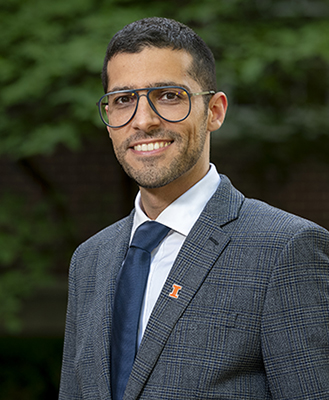Oct 24, 2023
Gaming the Future: Exploring the Predictive Power of Math
Research tells us a lot about the past, but it’s not always great at predicting the future, especially when there’s a conflict and multiple parties are involved. That’s where game theory comes into play. “With game theory, you can model a real-world conflict, even though you have very little data in hand,” said Gies teaching assistant professor Aram Bahrini, who uses math to explore various conflicts and how they can be resolved.

It's very different than most modeling.
“It provides solutions with minimal data. You just have to know the preferences of the players or decision makers,” explained Bahrini, adding that there are many different solution concepts that can be used. Some are rational. Some of them have foresight. And some even account for "disimprovements," a strategy in which players accept a loss in the near-term in order to reap future gains.
All of these concepts can be used to predict where players could potentially see themselves, which means game theory can inform decision-making in a wide range of endeavors, from science, to business, to the politics of war.
In “Social Choice Rules, Fallback Bargaining, and Related Games in Common Resource Conflict,” Bahrini uses game theory to explore one of the biggest causes of global conflict — limited access to resources. By gaming out various real-world scenarios involving Turkey, Syria, and Iraq, he was able to predict the conflict and how all three nations might work together to ensure access to limited water resources.
In the process, he also introduced a new approach, called “related games,” showing how the leading game impacts the outcome of consequential games and applying that to real-world conflicts. All of this could help global leaders make better decisions, using a mathematical framework.
In fact, it already has.
According to Bahrini, who joins Gies' Department of Business Administration, game theory has been proven to help the United States in many real-world scenarios, including the trade war between the US and China, the allocation of vaccines, and the fight against cancer. That’s why Bahrini is excited to bring its predictive capabilities to Gies.
When game theory is deployed, it’s usually on a theoretical level. “My focus is not only theoretical but also on interesting applications. So that’s what I’m bringing to Gies.”
Bahrini, who recently completed a PhD in systems engineering at the University of Virginia, also hopes to develop and teach a couple of new courses at Gies. One is called “Data Science for Supply Chain Forecasting,” and it’s also focused on practical application.
“This is a course I really, truly love, and it empowers students with the skills to clean, integrate, and analyze gazillions of data points for making informed managerial decisions,” said Bahrini, who believes it could be a game-changer.
Beyond his interest in math and teaching, Bahrini also has a penchant for new AI technologies, like Chat GPT, which he frequently uses in his daily life – from drafting documents to other basic chores. With a passion for innovation and a drive to advance his teaching career, he asked the chatbot's insights on Gies' unique opportunities.
“It gave me a bunch of ideas,” said Bahrini. From there, he made his own list. And at the top of that list was the school’s phenomenal reputation. “It’s consistently ranked at the top in business.” That, in turn, attracts a high caliber of students, creating a dynamic and stimulating classroom environment, which was also important to him.
“Then there’s the Center for Innovation in Teaching & Learning (CITL) – and Gies has its own Teaching & Learning team – which is really useful,” said Bahrini. Both CITL and Gies Teaching & Learning provide resources, workshops, and consultations designed to keep faculty at the top of their game, and they can be a big asset for young professors just starting their careers.
His passion for research was another factor that weighed heavily on his decision, and he saw a lot of potential there as well. During the interview process, Bahrini met with both IOSA Chair Gopesh Anand and Department Head Carlos Torelli. Together, they spelled out a wide range of resources available at Gies, whether he needed data, assistance with collaborations, or help with financial support.
With so many things coming together in one place, it didn’t take him long to realize that Gies was the ultimate win/win—the perfect place to explore the world of game theory and contribute to shaping the future.
